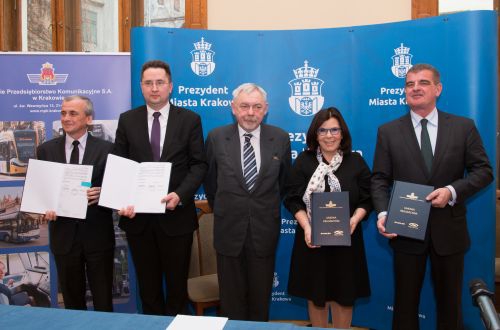The order for 35 trams is worth Zlotys 315m ($US 92.34m), which includes a subsidy of Zlotys 125m under the European Union’s (EU) Operational Programme Infrastructure and Environment for 2014-2020.
Delivery of the first new trams will take place at the beginning of 2020, with completion expected by the end of the third quarter of that year.
The 33.4m-long three-part low-floor vehicles offer 80 seats and room for 147 standing passengers and one wheelchair. The vehicles will feature air-conditioning, CCTV, LED lighting and a modern passenger information system comprising a voice announcement system and screens displaying the route. Each tram will also be fitted with a special platform to enable ease of access for disabled passengers, while the new trams’ 1.4m-wide doors will be wider than the current fleet. Passengers will also benefit from USB ports situated on railings for charging mobile devices while ticketing vending machines will be installed onboard the LRVs.
Passenger comfort is aided by the use of a specially-designed bogie frame on each of the vehicle’s four bogies, which will reduce wear on both the wheels and the track and serve to limit vibrations. Each vehicle will also be fitted with energy absorbers to minimise the effects of collisions with other vehicles.
MPK Krakow confirmed the order with Stadler and Solaris in November. Initially the operator had selected Pesa, which was the lowest-priced bidder for the contract. However, the operator said that Pesa had failed to deliver a Zlotys 29.9m guarantee despite reportedly entering into a credit agreement that could raise up to Zlotys 100m for execution of the order. MPK Krakow had earlier tried to exclude Pesa from bidding for the contract due to the late delivery of a previous order for Krakowiak LRVs, a decision that was overturned by Poland’s National Court of appeal.
“The signed agreement for the delivery of 35 trams marks the start of MPK ninth EU-funded Project,” says Mr Rafał Świerczyński, MPK CEO. “The value of all EU projects implemented by the Krakow operator already exceeds Zlotys 1.6bn, with EU funding for these projects amounting to nearly Zlotys 1bn.”

